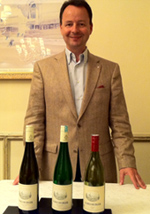 Schloss Gobelsburg is located in the Kamptal wine growing region in Lower Austria, around 80 kms north of Vienna. Wine production at the estate dates back several centuries. After taking over the winery in 1996, Michael Moosbrugger employed strict quality standards in the winery’s vinification and winemaking practices by first hiring a winemaker and then learning the ropes himself. His expertise and efforts have resulted in the winery being awarded the status of one of the world’s top 100 wineries of the year by the prestigious American magazine of ‘Wine and Spirits’ for the second time since 2010. Schloss Gobelsburg is located in the Kamptal wine growing region in Lower Austria, around 80 kms north of Vienna. Wine production at the estate dates back several centuries. After taking over the winery in 1996, Michael Moosbrugger employed strict quality standards in the winery’s vinification and winemaking practices by first hiring a winemaker and then learning the ropes himself. His expertise and efforts have resulted in the winery being awarded the status of one of the world’s top 100 wineries of the year by the prestigious American magazine of ‘Wine and Spirits’ for the second time since 2010.
The Grüner Veltliner varietal makes up 50% of total production, followed by Riesling (25%), St. Laurent (8%), Zweigelt and Pinot Noir (both 6%), and Merlot (5%). Vineyard work is done exclusively by hand and mostly follows organic practices, says Michael. A considerable proportion of Gobelsburger wines are exported. Mumbai based Aspri Wines and Spirits handles the distribution as part of their portfolio in India.
Over an exquisite four course dinner, Michael Moosbrugger introduced three of his estate’s finest wines:
-
The Riesling 2009 was medium-bodied with hints of white pepper. It had a long finish and fruity aromas that complemented the delicious smoked salmon just perfectly.
-
The 2009 Grüner Veltliner was served with seared scallop, but proved to be versatile as its peppery yet fruity flavour paired as effectively with the lamb loin.
-
The 2008 Zweigelt was a medium bodied crisp wine with cherry and spicy aromatics and strawberry flavours with leather notes in the back layer. It was elegant, fruit-driven with soft tannins and not heavily concentrated, giving it a distinctive elegant style.
Interestingly, all the wines had a moderately low alcohol content of 12.5% by volume enabling one to enjoy their full flavour with food. Michael took pains to explain that he believes in making wines that are light on the palate and low on alcohol and it is not his style to make them over-extracted or over-ripen the grapes till they increase the sugar level and the alcohol potential. Elegance and balance is what he is looking for, he said.
Even though these three stars of the evening were delicious quaffing wines, their pairing with the sumptuous dishes further highlighted their fruity flavours and mineral notes. Austrian wines are known to be dry, which would make one wonder as to why they wouldn’t prefer a degree of sweetness, typical of many European wine consumers. Moosbrugger explained, “In Austria we have never developed a sense of sweetness because we drink wine with food. When you drink your wine together with food you don’t develop a sense of sweetness.”
Present at Mr. Moosbrugger table were delWine’s President Subhash Arora, Aspri Spirits’ Arun Kumar and Sachin Abrol, Taj Hotels’ General Manager of Revenue Management, Karishma Singh and the recently arrived charming sommelier from Czech Republic via France, Marketa Sitarka. The Chambers at The Taj Mahal Hotel offered a truly pleasurable dining experience. The delicious food and impeccable service left the 50 odd guests present with a unique dining experience.
Although Germany and Austria are neighbours and both countries use the same German language, in the world of wine, the two countries have more differences than similarities – the main difference being that Austria produces dry wines while German wines carry a greater level of residual sugar, said Michael Moosbrugger while adding light-heartedly that the main difference between the two countries is that “we have a completely different sense of humour.”
Differences or not, Moosbrugger, who is also the President of Austria’s Traditional Winemakers Association, says that they have been working with the VDP of Germany to push the Erste Lage-First Growth concept; some of their vineyards are also First Growths.
 Earlier Michael brought out an interesting fact about Zweigelt- it is an off- shoot of Blaufränkisch with St. Laurent, an off- shoot of Pinot Noir as mother and unknown father- implying that pinot Noir is the grandmother of Zweigelt. While explaining the difference between Grüner Veltliner (increasingly known as Gru-Vee as it is getting popular in the US etc) and Riesling, he narrated an interesting anecdote about Abbot Bertrand of the monastery that owns the winery and has rented it out on a long term contract. He often used to visit the vineyards after Moosbrugger had taken over and used to say, ‘Grüner is for everyday drinking while Riesling is for Sunday.’ Earlier Michael brought out an interesting fact about Zweigelt- it is an off- shoot of Blaufränkisch with St. Laurent, an off- shoot of Pinot Noir as mother and unknown father- implying that pinot Noir is the grandmother of Zweigelt. While explaining the difference between Grüner Veltliner (increasingly known as Gru-Vee as it is getting popular in the US etc) and Riesling, he narrated an interesting anecdote about Abbot Bertrand of the monastery that owns the winery and has rented it out on a long term contract. He often used to visit the vineyards after Moosbrugger had taken over and used to say, ‘Grüner is for everyday drinking while Riesling is for Sunday.’
Those present at the eventful wine evening definitely drank the wines for the week and enjoyed them too!
For a related earlier article, please visit:
Austrian Wine :: Gobelsburg : Shattering Myth about Whites
Wines of the Austrian Monks
Rishi Vohra CSW |